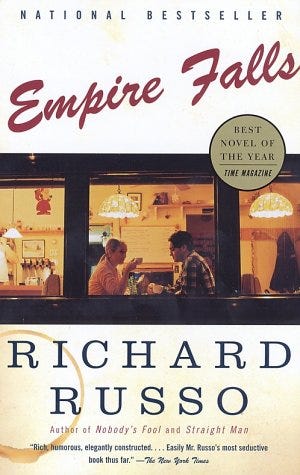Richard Russo: Eloquence and the "Amazon Jungle"
In the early fall of 2002, I herniated a disk in my lower back and spent three weeks lying on various floors in my house: The family room, the bedroom, my office. My family's memory of that time is bringing me dinner while I was lying on the ground and how interesting it was to find me lying on the floor next to the bed at night like a loyal pet.
For me, the memory is of Richard Russo's Pulitzer Prize winning novel Empire Falls. A timely, eloquent story of decline, fall and a middle aged man who must come to grips with the choices he has made in his life.

Time and hydrocortisone injections can heal wounds. The memory of physical pain quickly fades. While I could easily picture and identify with the fading New England mill town featured in the story, there was really nothing in Miles Roby's life that remotely mirrored mine. So I was able to move on and heal and be grateful to Mr. Russo for a comforting and interesting read at a time when I really needed one.
In Monday's New York Times, Russo wrote a very thoughtful Op-Ed piece entitled "Amazon's Jungle Logic" that bears close reading. In it he discusses a series of emails he exchanged with other American writers as he solicited their opinions on Amazon's smartphone app.
If you're an avid reader, bookstore browser, library user, novel collector, wouldn't you love to be able to exchange emails with the likes of Stephen King, Dennis Lehane, Ann Patchett, Anita Shreve, Tom Perrotta and Andre Dubus, III?
What was perhaps most interesting, to me at least, was the rather balanced, almost resigned approach the authors took to the latest flare up regarding this internet retail giant.
Blockbuster seller (and blog topic) Stephen King acknowledged that Amazon had done well by him in selling his books. He has a Kindle that he loves. But maybe the promotion was a "bridge too far."
Other authors like Scott Turow offered more lawyerly thoughts. However I think Ann Patchett, author and now part owner of a new independent bookstore in Nashville Parnassus Books summed it up best when she noted that:
There is no point in fighting them or explaining to them that we should be able to coexist civilly in the marketplace. I don't think they care."
(Bold face emphasis mine)
Russo summed up his piece with this memorable thought:
"Is it just me, or does it feel as if the Amazon brass decided to spend the holidays in the Caribbean and left in charge of the company a computer that's fallen head over heels in love with it's own algorithms?"
Not a computer, Mr. Russo. Most likely a whole team of very well educated, highly paid, nicely talented, and probably rather friendly staffers who believe in those algorithms and can show you lots of charts and graphs (with the appropriate circles and arrows) that point out why what they are doing is right. The Amazon brass left them in charge because they make money and improve shareholder value.
There's nothing inherently wrong or evil about making money or improving shareholder value. We can certainly agree that giving consumers a "good deal" is a worthy goal. But unless we want our future to look like a grimer version of Max Barry's "Jennifer Government" we should probably decide on which comes first, community or shopping; and how we balance the two.


